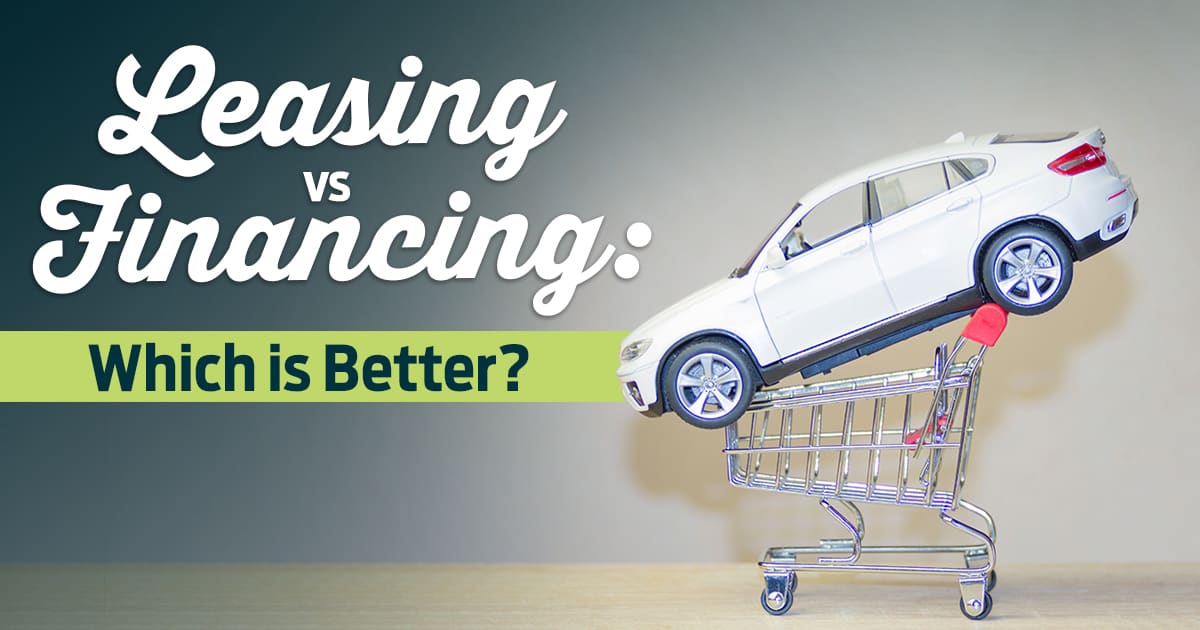
Leasing vs. Financing Your Car: Which is Better?
September 19, 2022
Share:
Shopping for a vehicle? Chances are, you’ve already been faced with the question – or even asked it to yourself – “should I lease or should I finance?”
There are several differences between leasing and financing, and the best option for you is largely dependent on your circumstances, your vehicle needs, and your financial obstacles. Suffice to say, a lot of money goes towards auto loans. It’s important that whatever decision you make is best for your lifestyle and fits within your allotted budget.
What is Financing?
Financing is essentially borrowing money to purchase a vehicle. To finance, you must apply through a lending company, through which you make regular payments. Financing means that you own the car that you purchase, but if you fail to make payments, then the lending company has every right to repossess your car and resell it to recoup what you could not pay.
What is Leasing?
Leasing is similar to financing, except the dealership owns your vehicle, and you are essentially being lent it from them until the end of the loan period. At the end of the loan period, the dealership takes the car back (ideally in good shape) and attempts to resell it. With some leasing agreements, you may make the decision to purchase the car at the end of the loan period.
The key difference between financing and leasing is in the ownership of the car. With financing, you own the car. It is yours to do what you will with it, so long as you are making regular payments to your lending company. Financing is more expensive than leasing, but you get the car at the end, and you typically will not have a cap on mileage. Leasing is less expensive, and it allows individuals to drive a shiny new vehicle, without needing to worry about reselling it.
How Do Payments Work?
When you make a lease agreement, it’s very similar to a rental agreement. Leasing requires you to make regular payments on a car for a short term (typically you’ll choose between 2 to 4 years), and you are required to return the vehicle once the lease is over. Depending on the contract, you may have the option to purchase the vehicle at the end.
However, with leasing, you are paying for the depreciation costs of the leased car, and so a leased vehicle will have much lower monthly costs than financing.
With leasing, there are a few options: a standard rental leases, which allow you to drive new cars so long as your credit score is approved. You’ll need to make an initial down payment and then monthly payments. With standard rental, you cannot purchase the car at the end and may either choose to extend your lease or trade it in for a newer vehicle.
A lease takeover is a lesser-known option that allows you to assume someone else’s lease payments. You’ll have overall fewer fees to pay, less upfront costs, and you might even have a cash incentive. Of course, there’s a certain risk with this option, as the car may be in worse condition, and you’ll also be inheriting the previous person’s mileage allotment.
Leasing to own allows you the option of purchasing your car at the end of the lease period. You will be making payments on a bi-weekly or a weekly schedule. You may not have the option of a newer vehicle with this lease agreement.
Should I Lease or Finance My New Vehicle?
Now that you know the key difference between leasing and financing – i.e, ownership – then it’s down to you to decide whether you’re going to lease or finance. Consider the following variables before you make your final decision:
- Do you want to use your car as an investment? With financing, once you have paid off your loan, you own the vehicle. You can use it to trade for a new vehicle or drive it as much as you’d like without needing to make further payments.
- What are your financial goals? If you believe you will be keeping your vehicle at the end of the loan period, leasing over the long-term is more expensive than financing. Just think: purchasing a single vehicle and driving it for a decade is generally far cheaper than purchasing numerous cars within the same period of time.
- How often or far do you drive? If you only drive around a little, kilometer limits aren’t an issue.
- Are you budgeting? Leasing is cheaper than financing if you aren’t sure if you want to keep the car at the end, and you can drive a new vehicle for far less than it would take to finance one.
- What do you like to have in a car for features? Leasing allows you to drive a new vehicle every few years so that you can enjoy all the new tech.
The biggest thing to note is with leasing there comes the restriction of kilometers driven per year. You may be charged a termination fee if you cancel your lease early, and if you end up causing excessive wear-and-tear to your vehicle before the lease ends you may be charged for repairs. Returning your car prior to the end of the lease can be expensive, so you’ll likely be stuck with this car for as long as your leasing period will last.
Financing is owning your vehicle – you’re basically taking out a loan to pay for the car over time. You have freedom with a financed vehicle, but it’s also more expensive, and there’s numerous pre-requisites you’ll have to meet before a lending company will agree to finance you.
It’s a tough decision to make, but ultimately it comes down to your goals, requirements, and wants. Note that with financing, you may qualify for lower rates. If you’re curious about the insurance reduction with financing vehicles, discuss it with Excalibur Insurance’s experts today!






